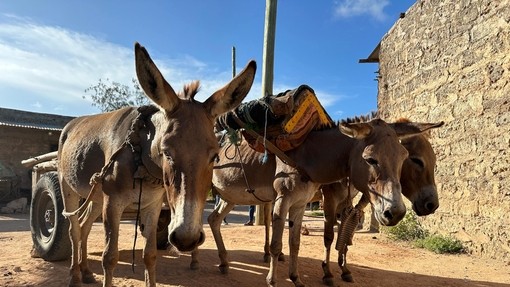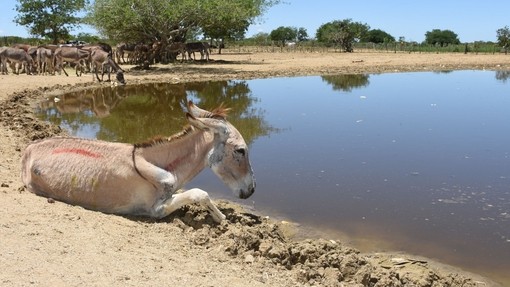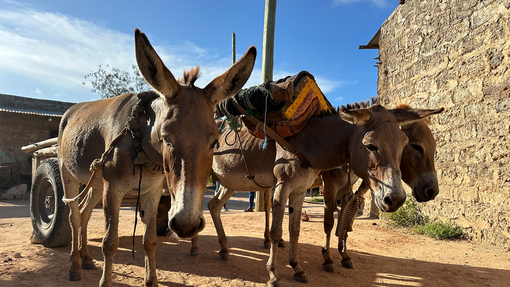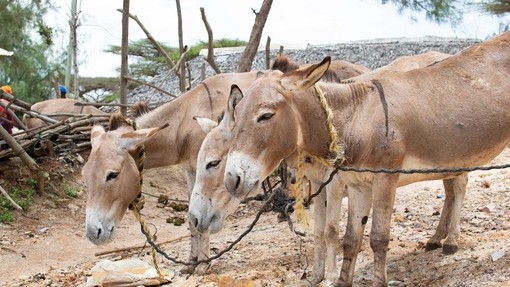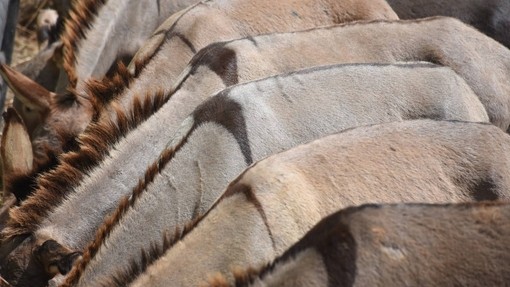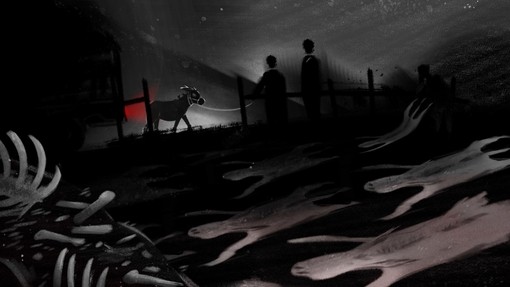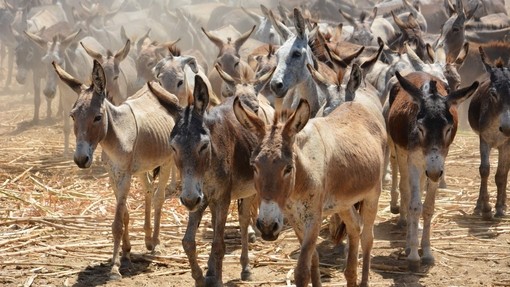
Do not change or delete this
When a donkey is stolen to meet the demands of the skin trade, its owners must deal with the tragic loss of a beloved and essential part of their family.
In many small African communities, the family donkey is an essential lifeline and member of the family.
So, when a donkey is stolen and sent for slaughter, it is not only a tragic loss of a beautiful animal, but a cruel twist to the lives of so many families who depend on their trusted companion in order to survive.
A small team from The Donkey Sanctuary recently visited Kenya to learn first-hand from people who have lost their beloved donkeys to slaughter, and the message rang through loud and clear: no more donkey slaughterhouses.
Why are donkeys slaughtered?
In addition to the slaughter of donkeys for meat, trade in donkey skins has expanded exponentially in recent years in order to feed the demand for a Chinese traditional medicine called ejiao.
Ejiao is produced by gathering gelatin from donkey skins. Of course, gelatin can be produced from a number of other animal skins, but it is specifically the presence of donkey as an ingredient in ejiao that makes it so sought-after.
So, not only can the theft of a donkey shatter a community in the short-term, but the fact that donkeys are in such high demand means that the cost of buying a replacement has also risen to unfeasible rates. Already, the skin trade has driven the cost of buying a donkey up by almost double to 20,000 Kenyan shillings (around £155).

Kenya is one of a few countries to have licensed the slaughter of donkeys and export their skins to China. Not only are the slaughterhouses sharply reducing donkey numbers in-country, but privately-owned donkeys from surrounding regions are also disappearing into abattoirs. Kenya has been dubbed by journalists as the ‘epicentre of East Africa’s donkey crisis’.
Donkeys loved and lost: the impact on Kenyan donkey owners
On the streets of Kiserian and Ongata Rongai, our team encountered the very real fallout of the donkey skin trade: the owners who are now missing an integral part of their family.
We met Stephen, who was without a source of income after his two donkeys were stolen just one week before our visit. His loss was compounded by the fact that, with the rise in the cost of donkeys generated by the skin trade, it is unlikely he will be able to buy another any time soon.
“I used my donkeys for general transport, collecting water, taking vegetables to market and carrying construction materials,” says Stephen.
“My donkeys were very close together and were stolen in the same night, and I am still recovering from the loss. I have heard much about the donkey slaughterhouses and they are causing the donkey thefts in this area – they should be closed down straight away; it is the only way to stop the thefts.”

The same sentiment was echoed by another former donkey owner, Fredrick, whom we met at a village water-filling point.
“These days, thieves steal donkeys to feed the local slaughterhouses,” says Fredrick. “My second donkey was stolen recently and now I can’t afford a new one.
“I rely solely on my donkeys, which is why I needed to rent one off another owner the very next day. It is eating into my daily income, as I have to pay KSh300 (GPB £2.30) every day.”

It is clear that the working donkeys at the waterpoint are well looked after. There is some shade for them to rest in, fodder for them to graze on, and, naturally, plenty of water on hand for them to drink. Although these donkeys work for their living, they are clearly also loved, cared for and respected – a far better life than can be hoped for stolen donkeys in East Africa, who are destined only for slaughter.

Taking measures: the Donkey Owners’ Self Help Association
100km away, we meet with the local Donkey Owners’ Self Help Association in the Lake Naivasha area. The local communities live in the shadows of one of Kenya’s most prolific donkey slaughterhouses, and understand the cost of the donkey skin trade first-hand.
John, Chairman of the association, has himself lost 12 donkeys and has organised demonstrations against the slaughterhouses. He told us of the very real risk of extreme poverty faced by families who have had their donkeys stolen:
“It is a loss of income and way of living; it is a loss of any support for the family, they can’t survive economically. We are sliding into extreme poverty, families have less food, no proper clothing, and no access to healthcare.”

For some owners, the importance of their donkeys is so great that they even take measures to protect them in their sleep.
“I sleep in my bedroom and my donkey sleeps in a structure next door,” says Simon, Vice Chair of the Donkey Owners’ Self Help Association.
“I have tethered the donkey through a hole in the wall and tied it to my bed so that if there is any movement I can wake up and catch the thieves.”

“The Kenyan Government made a mistake in making the trade legal. If it cares for its citizens at all, the slaughterhouses should be closed down.”
Visits like this one to hear the communities’ stories in their own words helps us to strengthen our argument that while the slaughter here may be licensed, at every other step of the way the supply chain is unsustainable, unregulated, inhumane, and should therefore be halted.
Help us protect donkeys
Share this page
Tags
- News

